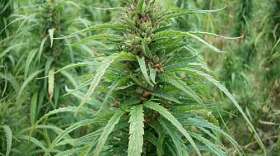The recent talk in Frankfort about legalizing industrial hemp hasn't convinced the head of the Kentucky Narcotic Officer's Association. Tommy Loving, who also leads the Warren County Drug Task, says he fears marijuana growers will plant their crops next to hemp, making it difficult for law enforcement to distinguish between the two.
Some agriculture experts say planting the two crops together would destroy the potency of the marijuana over time, but Loving told WKU Public Radio that wouldn't deter those looking to hide from law enforcement.
"If you plant marijuana with hemp surrounding it, for instance, in one growing season, you're not going to diminish that much of the THC content in the marijuana. So your marijuana crop is still going to be a sellable commodity,” said Loving.
Speaking after Monday's meeting of the Kentucky Industrial Hemp Commission, state Agriculture Commissioner James Comer responded to law enforcement opposition to hemp legalization.
“Everyone knows that industrial hemp is marijuana’s worst nightmare because it kills the toxicity in the marijuana plant,” Comer said. “So it is very troubling to me when I hear reports that marijuana growers and certain members of law enforcement are on the same side. The arguments from our opposition are shallow, misleading, and downright wrong. I believe the best way to get people off drugs is to put them back to work.”
A bill has been filed in the Kentucky legislature that would legalize industrial hemp. It's unclear, however, if that measure will ever be allowed to come up for a vote. Supporters, like state Agriculture Commissioner James Comer and the Kentucky Chamber of Commerce, say Bluegrass State farmers and businesses would benefit economically from legalizing the crop.
At the federal level, U.S. Senator Rand Paul, and Congressmen John Yarmuth and Thomas Massie of Kentucky have all spoken out in favor of removing hemp from a list of schedule one drugs.
Loving admits he senses an increased momentum behind the effort to allow the growing of the crop in Kentucky, but he says that won't stop law enforcement agencies from speaking out on the issue.
"Every time we find somebody with marijuana, they're going to say, 'oh, no--that's hemp'. So it'll have to go for a lab test. So the other problem there is that we're going to overwhelm the state police lab system, which is already a busy place to start with," says Loving.




